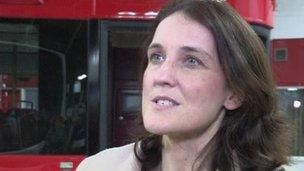Taoiseach hails bank debt deal as historic step for Ireland
- Published
BBC Newsline's business and economics editor Jim Fitzpatrick reports
The Republic of Ireland has reached agreement with the European Central Bank (ECB) to ease the 28bn euro (£24bn) bank debt burden from the nationalisation of Anglo Irish Bank.
Taoiseach Enda Kenny said it was "an historic step" on Ireland's road to financial recovery.
Ireland has until 2038 to make its first payment. The average interest rate will drop from 8% to just over 3%.
The Northern Ireland Secretary has welcomed the news.
Theresa Villiers said that anything that helped the Irish economy was welcome in Northern Ireland because of the linkages between the two economies.
"There are a lot of inter-linkages between the banking systems, given that a lot of the banks that serve Northern Ireland have headquarters in Dublin," she said.
"It sounds like this is a step forward and there are still significant issues with the banking system in the Republic of Ireland but I am pleased that they seem to have made progress today."
Earlier, ECB president Mario Draghi said it "took note" of the Irish government's action.
The deal means that promissory notes - effectively IOUs which currently carry interest rates of 8% - are expected to be turned into long-term loans. The promissory notes had been used to fund the former Anglo Irish Bank.
Mr Kenny told the Dáil that the Promissory Notes were, in his government's view, "a highly onerous and unfair legacy of the banking crisis". The new arrangement was "fairer and more sustainable", he said.
"The remnants of Anglo Irish Bank and Irish Nationwide - stains on our international reputations and dents to our national pride - have now been removed from the financial and political landscape," the taoiseach (Irish prime minister) said.

Theresa Villiers said anything that helped the Irish economy was welcome in Northern Ireland
"Their closure bookends a tragic chapter in our country's history. The annual Promissory Notes payments are gone."
He added: "We have replaced a short-term, high interest rate overdraft that had to be paid down quickly through more expensive borrowings, with long-term, cheap, interest-only loans."
Mr Kenny said this was "no silver bullet" to end all of Ireland's economic problems and that there was a long way to travel back to prosperity. However, he said it was "a vastly better deal".
Gerry Mallon, chief executive of Danske Bank in the UK and Ireland, said this should be "an enormous positive for the Irish exchequer and, as a consequence, for the Irish economy as a whole."
"Anything which is good for the Republic of Ireland economy has also got spill-over benefits for Northern Ireland," he said.
"They are a strong trading partner. We see tourism, we see cross-border trade happening and so, anything which is good for Ireland is good for Northern Ireland."
The Anglo Irish was nationalised in 2009, having suffered the largest loss in Irish corporate history. It was merged with the equally toxic Irish Nationwide Building Society and was renamed the Irish Bank Resolution Corporation (IBRC) and given the sole task of recovering debts.
The Irish government has now liquidated the IBRC to pave the way for restructuring the bank bailout.
Under the plan the bank, now the IBRC, ceases to exist. Its debt changes into a long-term bond (form of loan).
Emergency legislation passed both houses of the Irish parliament on Wednesday night. Irish president, Michael D Higgins, was recalled from an official visit to Italy to sign the legislation.
The scheme is designed to ensure the repayments are reduced and spread over a longer period.
The debt had been costing Irish taxpayers 3.1bn euros each year.
The legislation went through parliament after details of negotiations between the Irish government and the ECB were leaked on Wednesday.
In a session running into the early hours of Thursday, politicians in the lower house of the Irish parliament voted through the legislation by 113 to 36.
The Republic of Ireland's central bank governor, Patrick Honohan, had been negotiating the plan with the European Central Bank (ECB) late on Wednesday.
IBRC's board was dismissed on Wednesday and the accountants KPMG are now running the bank.
IBRC's loans are to be transferred to the National Asset Management Agency (Nama), the Irish "bad bank" responsible for recovering the value of problematic loans made by other Irish banks.
The bank was among the most prolific of lenders to property speculators and developers during the Irish Republic's housing bubble in the last decade.
- Published7 February 2013
- Published7 February 2013
- Published7 February 2013
- Published7 February 2013
- Published30 January 2013
- Published29 November 2012